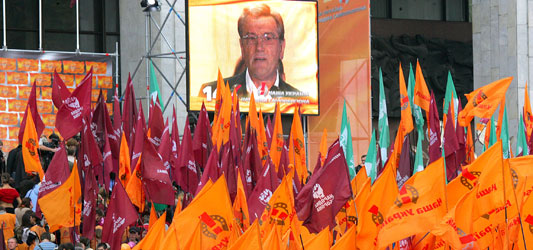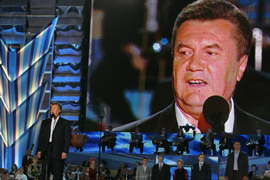A tale of two Viktors
Two men at the heart of a contest that shows Ukraine is split between east and west.

 |
| Supporters of Yushchenko’s ‘Our Ukraine’ party rally on the final day of campaigning [AFP] |
The parliamentary elections in Ukraine on Sunday will see two men pitted against each other who personify the difficulty the country is having in deciding if it should pursue closer ties with Russia or with the West.
Viktor Yanukovych, the Ukrainian prime minister hails from the Russian-speaking east of the ex-Soviet republic, while his rival the president, Viktor Yushchenko, hails from the west.
Yushchenko currently shares power with Yanukovych in an alliance that has led to political wrangling and constitutional paralysis.
The election, in which Yushchenko’s Our Ukraine party, and Yanukovych’s Regions party are expected to capture most of the vote, was called after months of political deadlock, and accusations of corrupution and bribery.
Support
On Thursday, Yushchenko announced that an alliance had been formed between his party and political bloc of the “heroine” of the “Orange Revolution” of 2004, Yulia Tymoshenko, sacked as the prime minister of his first government.
Yushchenko made it clear that Tymoshenko could once again become prime minister if voters return an “orange” majority on Sunday.
Both Tymoshenko and Yuschenko aim to unite “orange” supporters, in their resolve to win a majority, form a government and force Yanukovich out.
Yanukovych, who was defeated in his presidential bid against Yushchenko during the “Orange Revolution”, has backing from billionaire oligarchs who control most of the former Soviet mines and steelworks in the east of Ukraine and has mounted a slick, well-funded election campaign.
His support base has traditionally been from the east of the country, whereas Yuschenko holds sway in the west, and Tymoshenko in central Ukraine.
Pro-Europeans
 |
| Yanukovych, leader of pro-Russian Regions Party, has mounted a slick campaign [AFP] |
While Yanukovych’s support base and campaign has been pro-Russian, both contenders have marketed themselves as pro-European for very different reasons.
Yanukovych has been accused of seeing Europe as an open market for selling cheap gas from Russia, while Yushchenko has made it clear that his objective is to transform a post-Soviet country into a democratic European one.
Despite allegations of corruption in his party, Yushchenko’s support has come from Ukrainian millionaires vocal about wanting to cut business deals within clear rules and independent courts – something accession to European will provide.
Another point of divide between the parties is the issue of Nato and the Crimea region.
Yushchenko wants the Ukraine to join Nato, but Yanukovych’s Regions party, which carries half the vote in Crimea – an autonomous republic of Ukraine on the northern coast of the Black Sea – wants to keep Nato out, and a referendum on keeping Russian as an official language there.
If Ukraine joins Nato, the presence of Russia’s large naval fleet in the Crimea would be in jeopardy, and the area would come under Nato command.
Divide and rule
Yushchenko came to power on a promise to clean up Ukrainian politics, but his orange coalition descended into turmoil just moths after the appointment of Tymoshenko as prime minister.
The economy was damaged by Tymoshenko’s price caps on fuel and other commodities and as a result, fierce internal rows and corruption scandals led to the collapse of the government.
A parliamentary election followed in early 2006, and Yanukovych’s Regions party took the biggest share of the vote.
More infighting on the “orange” side laid the pathway for Yanukovych to become prime minister. Since then, under a compromise with the orange bloc, many presidential powers were transferred to parliament.
While Sunday’s confrontation between the “two Viktors” is likely to be close, a period of long and difficult negotiations will certainly follow to form a stable majority in the 450-seat assembly necessary to form a government.